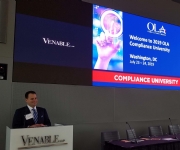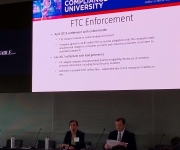Consumer Financial Protection Bureau's Spring 2019 Regulatory Agenda
The Consumer Financial Protection Bureau (CFPB or the "Bureau") issued its Spring 2019 Regulatory Agenda (the "Spring Agenda")—a biannual outline of the Bureau's rulemaking activities. This is the first regulatory agenda issued since the new director—Kathy Kraninger—took office in December 2018. The Spring Agenda builds on the Bureau's 2018 "Call for Evidence" initiative and includes a mixture of new projects, reviews and revisions of prior rulemaking, and implementation of statutory directives.
Payday Rule's Mandatory Underwriting Provisions Delayed
The CFPB finalized one part of its regulatory rollback of the Payday, Vehicle Title, and Certain High-Cost Installment Loans Rule (the "Payday Rule"), promulgating on June 6, 2019 a final rule delaying the effective date of the Mandatory Underwriting Provisions until November 19, 2020. It is unlikely that the Mandatory Underwriting Provisions will ever go into effect in their current form (if at all), since the CFPB has separately proposed to rescind them.
Multistate Probe of Payroll Advance Industry
The New York Department of Financial Services (NY DFS) announced it is leading a multistate investigation into the payroll advance industry and allegations of unlawful online lending. According to the NY DFS press release, "The investigation focuses on whether companies are in violation of state banking laws, including usury limits, licensing laws and other applicable laws regulating payday lending and consumer protection laws."
Panelists Weigh in on "Abusive" Practices at Inaugural CFPB Symposium
In her commencement speech at the Consumer Financial Protection Bureau's (CFPB) inaugural Abusive Acts or Practices Symposium on June 25, 2019, Director Kraninger stated that she hoped that the symposium would result in "commonsense ideas . . . to help inform the Bureau's policy development process" and that the CFPB will continue to engage the public and experts to fulfill "its important mission of consumer protection." The focus of the symposium was the term "abusive" in the Dodd-Frank Act, specifically whether the term warrants clarification and, if so, how the term should be clarified. The CFPB enlisted two panels of law professors, former and current regulators, and private sector lawyers.
Six Reasons to Have a Fintech Strategy
Financial technology, or fintech, is rapidly and dramatically changing the financial services landscape, forcing banks to respond.
Banks are taking different approaches to capitalize on the opportunities presented by fintech, mitigating the risks and remaining competitive. Some of these approaches include partnering with fintech companies, investing in them, investing in internal innovation and development or creating or participating in fintech incubators and labs. Some banks focus on a single strategy, while some mix and match. But many have no plan at all.
CFPB Extends Debt Collection Rulemaking Comment Deadline
The CFPB has extended its deadline for comments on the proposed rule to modernize the Fair Debt Collection Practices Act to September 18, 2019.
For details on the proposed rule, see our article, "CFPB Issues Proposed Debt Collection Rules," and the proposed rule.
Compliance University Recap
Attorneys from Venable's Consumer Financial Services Practice Group recently presented at the Online Lenders Alliance Compliance University, held at Venable's Washington, DC office. The conference focused on the evolving legal and regulatory landscape for consumer lenders, small business lenders, service partners, investors, and bank representatives, and the latest trends in fintech and regtech. Sessions participated were: "Compliant Third Party Oversight: Keys to Successful Vendor Management" (Jonathan L. Pompan), "Engaging with Regulators: How to Approach Agency Supervision and Investigations" (Allyson Baker), "Navigating Consumer Privacy and Strategies for Safeguarding Data" (Emma Blaser), and "Compliance University Recap: Where Do We Go From Here?" (Jonathan L. Pompan).


